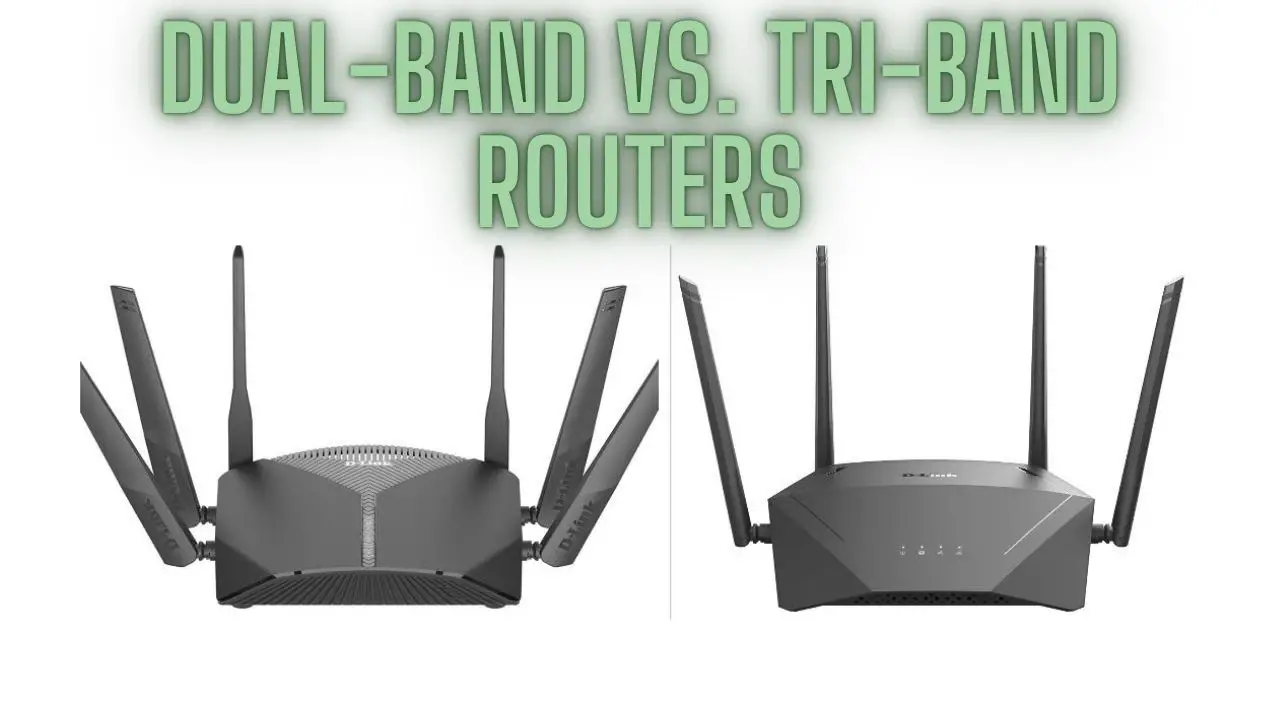Introduction
In the fast-paced digital world we live in, having a reliable and high-performing wireless network is crucial. Whether it’s for streaming, gaming, working from home, or connecting multiple devices, the choice of router can significantly impact your network’s performance. Dual-band and tri-band routers are two common options, each with its own set of advantages and use cases. In this in-depth guide, we’ll explore the differences between dual-band and tri-band routers, helping you make an informed decision when it comes to upgrading or setting up your home network.
1. Understanding Wireless Router Frequencies
1.1. Frequency Bands in Wireless Networking Wireless routers operate on specific frequency bands, typically 2.4 GHz and 5 GHz. These frequency bands offer different advantages and trade-offs when it comes to network performance and coverage.
1.2. The Birth of Dual-Band and Tri-Band Routers The demand for faster and more reliable wireless networks led to the development of dual-band and tri-band routers. Dual-band routers operate on both the 2.4 GHz and 5 GHz bands, while tri-band routers add an additional 5 GHz band for enhanced performance.
2. Dual-Band Routers: The Basics
2.1. Dual-Band Frequency Bands Dual-band routers simultaneously broadcast on the 2.4 GHz and 5 GHz bands. The 2.4 GHz band provides wider coverage but slower speeds, while the 5 GHz band offers faster speeds but shorter range.
2.2. Use Cases and Advantages Dual-band routers are suitable for small to medium-sized homes with moderate internet use. They offer good coverage and are cost-effective.
2.3. Limitations They may struggle with high-density areas or homes with numerous connected devices due to limited bandwidth.
3. Tri-Band Routers: The Next Level
3.1. Tri-Band Frequency Bands Tri-band routers operate on three frequency bands: one 2.4 GHz and two 5 GHz bands. These routers are designed to handle more devices and offer increased network capacity.
3.2. When to Consider a Tri-Band Router Tri-band routers are ideal for larger homes, homes with multiple users and devices, and situations where network congestion is a concern.
3.3. Limitations They are typically more expensive than dual-band routers and may not be necessary for smaller setups.
4. Performance Comparison: Dual-Band vs. Tri-Band
4.1. Speed and Capacity Tri-band routers offer greater speed and capacity, making them better suited for demanding tasks like 4K streaming and online gaming.
4.2. Network Congestion Tri-band routers handle network congestion more effectively due to the additional 5 GHz band.
4.3. Range and Coverage Dual-band routers may offer slightly better coverage due to the 2.4 GHz band’s longer range, while tri-band routers excel in large homes with multiple devices.
5. Selecting the Right Router for Your Needs
5.1. Home Network Size and Layout Consider the size and layout of your home when choosing between dual-band and tri-band routers.
5.2. Number of Connected Devices The number of devices on your network is a critical factor in router selection.
5.3. Specific Use Cases Different routers are better suited for various tasks, such as gaming, streaming, and working from home.
6. Dual-Band vs. Tri-Band for Gaming
6.1. Gaming on Dual-Band Routers Dual-band routers can provide a good gaming experience but may struggle in high-traffic scenarios.
6.2. Gaming on Tri-Band Routers Tri-band routers offer lower latency and handle gaming traffic with ease.
6.3. Latency and Ping Considerations Low latency and minimal ping are crucial for online gaming, and tri-band routers excel in delivering these characteristics.
7. Dual-Band vs. Tri-Band for Streaming
7.1. Streaming on Dual-Band Routers Dual-band routers can handle HD streaming but may encounter issues with 4K and multiple simultaneous streams.
7.2. Streaming on Tri-Band Routers Tri-band routers offer seamless 4K streaming and can handle multiple streams simultaneously.
7.3. 4K and HD Streaming The choice between dual-band and tri-band becomes critical when considering high-definition and 4K streaming needs.
8. Dual-Band vs. Tri-Band for Home Offices
8.1. Home Office Connectivity Needs Working from home often requires stable and high-speed internet connections.
8.2. Video Conferencing and Remote Work Tri-band routers are better equipped to handle video conferencing and remote work requirements.
9. Advanced Router Features and Technologies
9.1. MU-MIMO and Beamforming These technologies play a role in optimizing wireless performance and device connections.
9.2. Quality of Service (QoS) QoS settings allow you to prioritize specific devices or applications for a better online experience.
9.3. Security and Parental Controls Router security features and parental control options are essential for maintaining a safe and family-friendly network.
10. Router Placement and Optimization Tips
10.1. Optimal Router Placement Proper router placement can significantly improve network coverage and performance.
10.2. Reducing Wireless Interference Minimizing interference from other electronic devices is crucial for network stability.
10.3. Regular Firmware Updates Firmware updates ensure that your router operates at its best and stays secure.
11. Future-Proofing Your Home Network
11.1. Wi-Fi Standards: 802.11ac vs. 802.11ax Consider the latest Wi-Fi standards when future-proofing your network.
11.2. Preparing for Future Connectivity Demands Anticipating future connectivity needs can save you from frequent upgrades.
12. Router Brands and Models to Consider
12.1. Top Dual-Band Router Picks A list of top dual-band routers for various budgets and needs.
12.2. Top Tri-Band Router Picks A selection of top tri-band routers with different features and price points.
12.3. Budget-Friendly Options Affordable router options for those on a budget.
13. Security and Privacy Considerations
13.1. Securing Your Wireless Network Securing your wireless network is essential to protect your data and privacy.
13.2. VPN Support Routers that support VPNs can enhance your online privacy and security.
14. Setting Up Your Dual-Band or Tri-Band Router
14.1. Initial Configuration Guidance on the initial setup of your router, including network names and passwords.
14.2. Guest Networks Creating a guest network for visitors while keeping your primary network secure.
14.3. Firmware Updates Instructions on how to check for and install firmware updates.
15.
Troubleshooting and Common Issues
15.1. Slow Network Speeds Addressing issues with slow network speeds and ways to improve performance.
15.2. Connection Drops Troubleshooting and resolving network connection drops.
15.3. Limited Coverage Area Solutions for extending your network’s coverage area.
16. FAQS
What is the main difference between dual-band and tri-band routers?
The main difference lies in the number of frequency bands they operate on. Dual-band routers have two frequency bands (2.4 GHz and 5 GHz), while tri-band routers have three frequency bands (one 2.4 GHz and two 5 GHz bands).
When should I choose a dual-band router?
Dual-band routers are suitable for smaller homes, apartments, or setups with moderate network traffic. They are cost-effective and provide good coverage for basic internet use.
When should I consider a tri-band router?
Tri-band routers are best for larger homes, setups with numerous connected devices, and situations where network congestion is a concern. They excel in high-demand scenarios.
Do tri-band routers offer better internet speed than dual-band routers?
Tri-band routers can offer better internet speed in certain scenarios due to the additional 5 GHz band. However, the actual speed improvement depends on factors like your internet plan and device capabilities.
Are tri-band routers more expensive than dual-band routers?
Yes, tri-band routers are typically more expensive than dual-band routers due to their advanced technology and additional frequency band.
Can I use a tri-band router in a smaller home or apartment?
Yes, you can use a tri-band router in a smaller space, but it might be overkill unless you have a substantial number of connected devices or foresee future expansion of your network.
Do tri-band routers have better coverage than dual-band routers?
Dual-band routers might offer slightly better coverage due to the longer range of the 2.4 GHz band. However, tri-band routers excel in providing coverage in larger homes and spaces with multiple devices.
Are tri-band routers necessary for gaming?
Tri-band routers can provide a smoother gaming experience, especially in high-traffic environments, but they are not an absolute necessity for gaming. Dual-band routers can also be sufficient for most gaming needs.
Which router type is better for 4K streaming?
Tri-band routers are better suited for 4K streaming because they offer higher bandwidth and can handle multiple streams simultaneously, providing a buffer-free streaming experience.
Can I use a tri-band router with a slower internet plan?
Yes, you can use a tri-band router with a slower internet plan, but the router’s capabilities may not be fully utilized. Tri-band routers are most beneficial when you have a fast internet plan and numerous connected devices.
What are some advanced router features and technologies that are relevant to dual-band and tri-band routers?
Features like MU-MIMO, Beamforming, Quality of Service (QoS), and security options apply to both dual-band and tri-band routers. They enhance network performance, device connections, and security.
How can I optimize the placement of my router for better performance?
Optimal router placement, reducing wireless interference, and performing regular firmware updates are essential for maximizing your router’s performance. Proper placement can enhance network coverage and speed.
Is it worth considering Wi-Fi standards when selecting a router?
Yes, it’s essential to consider the Wi-Fi standards (e.g., 802.11ac, 802.11ax) supported by the router, as they determine its capabilities and future-proofing potential.
What should I do to secure my wireless network with my dual-band or tri-band router?
Securing your wireless network is crucial to protect your data and privacy. Follow recommended security practices, such as setting strong passwords and enabling WPA3 encryption.
Can I set up a guest network with my dual-band or tri-band router?
Yes, most dual-band and tri-band routers offer the option to create a separate guest network, allowing visitors to access the internet without gaining access to your primary network.
What should I do if I encounter common router issues like slow network speeds or connection drops?
Troubleshoot common router issues by addressing slow network speeds, connection drops, and limited coverage areas with strategies like optimal router placement and firmware updates.
17. Conclusion
The choice between a dual-band and a tri-band router ultimately comes down to your specific needs, the size of your home, the number of connected devices, and the demands of your network activities. By understanding the differences and advantages of each, you can make an informed decision to ensure that your wireless network meets your requirements and keeps up with the evolving demands of the digital age.

